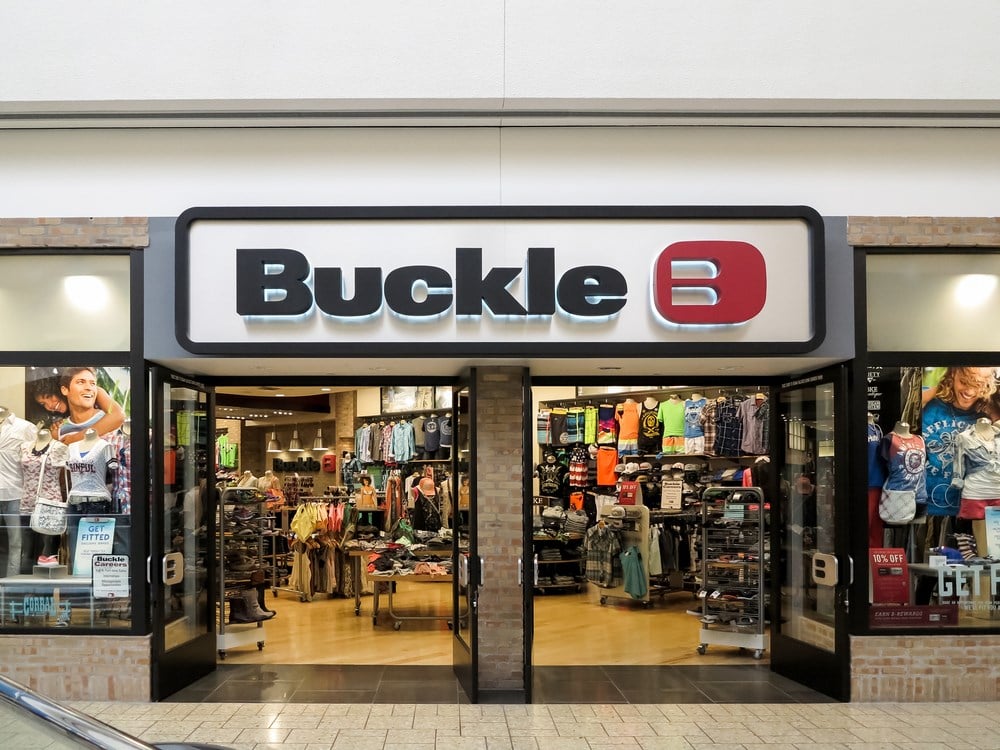
Shares of Buckle (NYSE: BKE) seem indifferent toward the company's first quarter 2023 earnings results, which were laid out for the public to digest during the pre-market hours of Friday morning. Though short, Buckle's press release gave investors a brief window into the challenges the apparel industry has faced for most of 2022.
Despite what bears may say, analysts are pointing to attractive upside potential via their price targets, which may stem from a more significant macroeconomic factor affecting Buckle's real estate portfolio, more importantly, current asset class valuations and what that means for its future income potential.
As the company saw its earnings per share rise as high as $1.69 during 2022, pivoting dynamics within the industry have been affecting its profitability and, therefore, public perception. However negative these headwinds may be, there are reasons to believe that the stock price decline initiated at the start of 2023 is an exaggeration that could be rectified by long-term value investors realizing just how much value there could be in a recovery play.
Technical analysts will be pleased to be staring right into what seems to be a crystal ball, which for once is shaking hands with value investors, who stand on the opposite end of the analysis spectrum.
The Results, Not so Good
The retail industry, just like any other, carries its set of viable and widely followed key performance indicators (KPIs). Comparable sales growth and decline take the spotlight every time investors come in to check the vital signs of any retail business, and Buckle seems to have dropped the ball on this one.
Posting a 9.2% decline for the first quarter of 2023 relative to the first quarter of 2022 should have been enough to send the stock crashing after the press release announcement. After noticing a silent reaction in the stock price, markets wonder what is holding the stock up. When breaking down the company's profitability, it tells a similar story.
Gross margins declined to 47.1% from 49.2% a year prior. However, these levels are still within longer-term figures when analysts exclude the effects of a heated apparel industry during 2022. Operating margins showcased similar contractions, though telling investors a compelling story.
While selling expenses declined by just over a million dollars, they increased by 2% as a percentage of revenue, showcasing added incentive compensation to cycle through aging inventories. Buckle's financials will show that these added incentives were necessary to counteract the slowdowns seen in activity measures.
Inventory turnover, a proxy for underlying activity within a business, declined from 1.3x in 2022 to the end of the first quarter of 2023 at 1.1x. Similarly, capacity utilization saw a significant decline; capacity utilization is often referred to as a measure of the balance between supply and demand, where a higher reading represents advancing demand and insufficient supply.
The apparel industry has been carrying a five-year average capacity utilization above 75%, with its latest readings sporting a 76%, marking the lowest reading in two quarters, considering that January of 2023 posted a 78.5% reading. Buckle's capacity utilization for the first quarter - which includes that high January industry reading - was only 33%, severely underperforming the averages and signaling that demand is not trickling down to Buckle's products. When sales were soaring and profits advancing in 2022, this reading still stood at 37%; it seems Buckle has much inventory management to do.
The Way Up
Over seven years, Buckle has delivered investors average returns on capital that are nothing to scoff at. ROIC (Returns on Invested Capital) carried a 25.2% average over these seven years, with its most recent rate of 28.5% dangerously close to the trailing average. Since Buckle is a retail company that carries a lot of fixed and physical assets in the form of inventory and properties, measuring its ROA (Return on Assets) is a more appropriate measure of management effectiveness.
Seven-year average ROA for Buckle shows a 22.0% rate, a beautiful standing against other retail operators. However, today's rate is well above average, reading 28.5% during the first quarter.
The discrepancy between the current rate and the average can be attributed to the company's deleveraging initiatives, as debt represented 50.2% of the total capital in the business at the start of 2023; today, it only adds 44.5% to the mix. What is essential for investors to understand, and to spot where the next sales push may come, is the current real estate dynamics affecting malls and other shopping centers.
Simon Property Group (NYSE: SPG) is an owner and operator REIT (Real Estate Investment Trust) focused on malls and shopping centers across the United States; Its NYSE: SPG" target="_blank" rel="noopener">valuation may tell markets where the cycle is for its underlying customers, including Buckle.
The answer lies in the Capitalization Rate (Cap Rate) used to value real estate, calculated by any property's NOI (net operating income) divided by the property's market price. In the sense of a stock, investors could take a similar measure by taking the stock's dividend yield. Today, Simon Property Group's dividend yields 7.3%, which would be considered a high cap rate since attractive real estate is typically valued between 6% and 8% cap rate.
Considering that the mall REIT has not broken out of its trading price channel, it is safe to assume that the NOI will be credited with the rising cap rate (or dividend yield in this case). Similarly, BKE stock dividend yields nearly 13% today. Buckle's dividend yield is enabled by undervaluation and elevated financial levels.
Buckle analyst rating points to an 18% upside from today's prices, which may point to these property dynamics at play or the fact that the company's return on capital metrics is as attractive as ever. Technically speaking, the stock is trading near a heavily traded support range between $30 and $35 per share. Additionally, the price is within the Fibonacci 'golden ratio' retracements since the bottoming in July 2022. Whichever way markets look at Buckle, there is some overlooked value.





